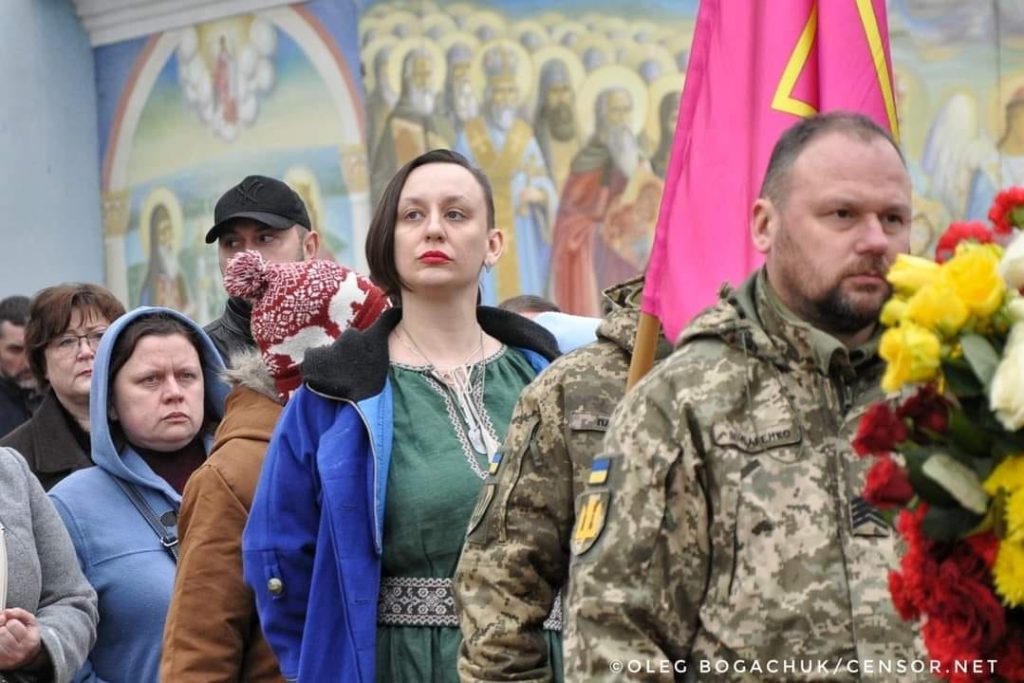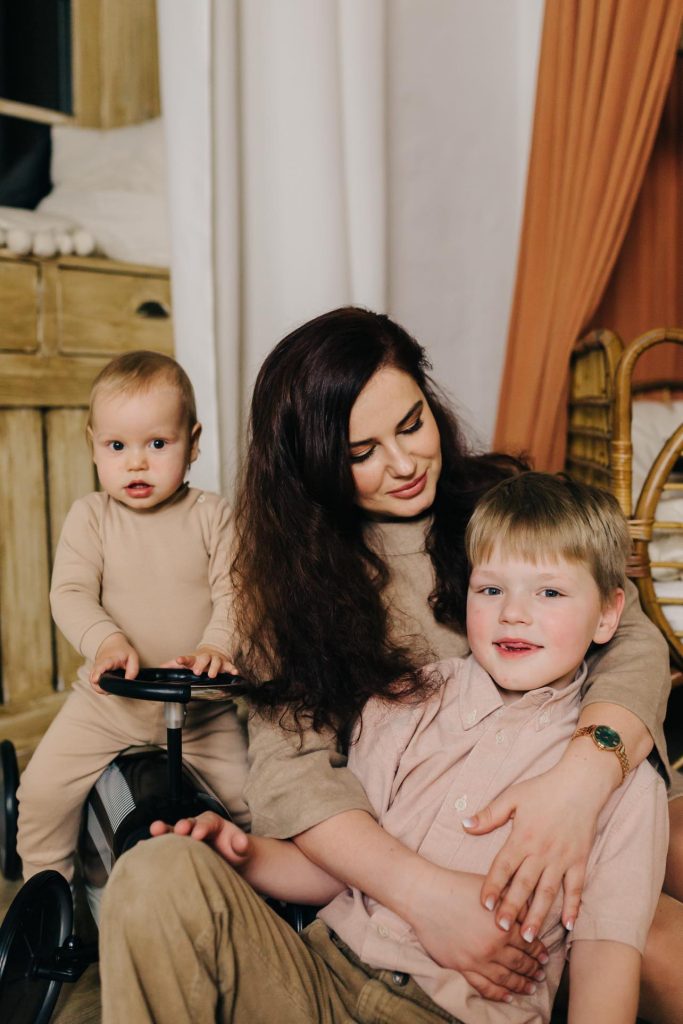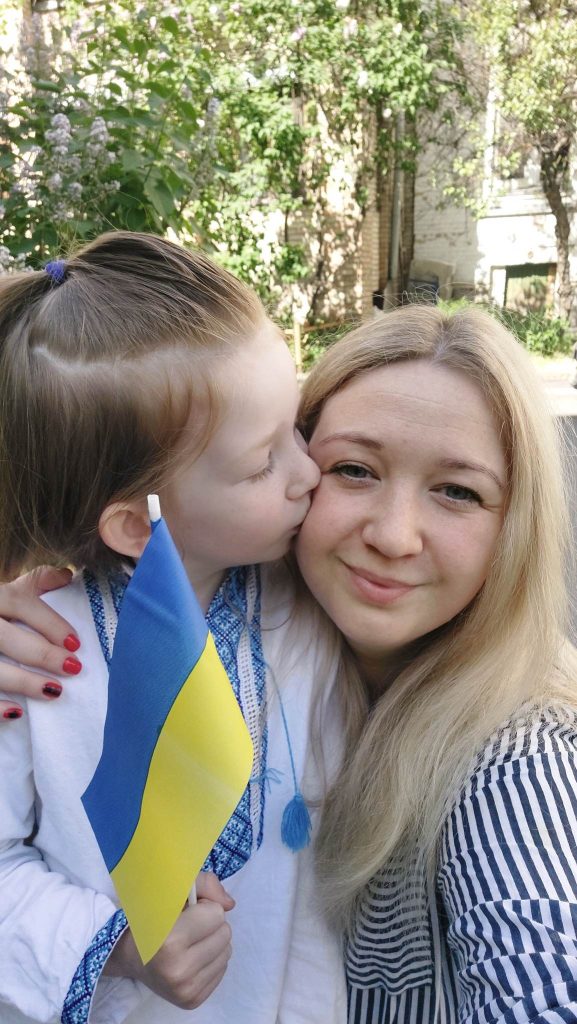The Kolesnichenko family had always lived happily in Avdiyivka, near Donetsk. But in May 2014, on so-called referendum day, Yevhen and his wife Yivga were taken hostage by pro-Russian terrorists when they went out to buy groceries.
Yivga had a yellow-blue ribbon on her backpack. Local police tried to negotiate with pro-Russians to save the family. And succeeded. “We were given 24 hours to take our three little children and to leave the region. That’s what we did”, she recalls.
The family moved to Kyiv. And decided to switch the family language to Ukrainian after what Russians had done to their lives. They read a lot in Ukrainian, practiced, and became ever more fluent. Even so, their children heard a lot of Russian at school. Some teachers would conduct lessons in Russian too. “At first I didn’t argue much. But later I did, later I never left the language issue ‘to its fate,’” Yivga says.
The name Yivga is a bit new to her because she used to be Yevheniia (Eugenia in the Russian or Slavic manner), but transferred to the ancient Ukrainian version of her name. That decision came soon after her husband, handball champion Yevhen Kolesnichenko, was killed while fighting with the Ukrainian army near Bakhmut late last year.

Now Yivga is at the frontlines too, as a paramedic. Her three children are staying with a family friend in Poland.
Iryna Bilan’s background is different. She always spoke Ukrainian in her small town near Kyiv. But as a teenager visiting the capital, she started switching to Russian. “There was a shame in speaking Ukrainian. As if you were from a village, were not modern. A lot of young people spoke Ukrainian in home towns, but Russian in major cities,” she says. When she entered university in Kyiv, the switch became almost complete.
Iryna’s future husband, Alex, a Kyiv native, was also bilingual. His mother spoke Russian, but his father made a conscious choice to speak Ukrainian in the 1990s. Alex himself spoke Russian most of the time, so that was the language his young family spoke. It became the first language of their first son, Artem. His parents wanted him to know both languages, but in the end, the kid spoke only Russian. “I understood something is terribly wrong when he was five, and his grandfather spoke Ukrainian to him. And my son replied, ‘Speak to me normally.’
“That was very unpleasant to me,” Iryna remembers. She started speaking Ukrainian to the child more but still used both languages.
On February 24, 2022, the family became trapped in traffic jams to leave Kyiv when “we heard explosions all around . . . That’s when I understood that I will never speak Russian again,” Iryna says. Once they reached Poland, Artem “was worried. He asked me if strangers might think we are Russian if we speak Russian.”

The family is back in Kyiv and the kids speak Ukrainian. “Speaking Ukrainian now obviously doesn’t mean that you come from a village, that you aren’t educated enough, that you aren’t cool!”
Artem sometimes switches to Russian with friends but has at the same time begun to negatively react to Russian in the streets. Unsurprising perhaps, when the Russian armed forces are bombarding his city.
Olena Kozachenko’s son Yaromyr has spoken Ukrainian since his birth, although about 80% of children in his preschool group spoke Russian, and it was difficult for the child to understand the language and why they speak differently. “When he was two and a half, I couldn’t explain him. But now he’s five . . . even so, Yaromyr reacts sharply to Russian.”

Vitalyna Maslova and her two little kids are now in Sweden; her husband is at war. She felt overwhelmed when a babysitter provided by an EU-funded Swedish foundation could only offer a Russian-speaking babysitter when she tried to take professional development courses for Ukrainian women. In the end, she took the classes remotely.
It seems that fewer and fewer Ukrainians will tolerate Russian as their language. It is, after all, the language of their invader. As the responses of little Artem and little Yaromyr make clear, there is a new generation emerging for whom Russian is an enemy language.
Opinion polls show the share of Ukrainians who speak Ukrainian in everyday life increased from 64% in 2021 to 71% in 2022. That trend will surely continue.

We spoke Russian for centuries. We still do. But Vladimir Putin’s invasion to “protect” Russian speakers has instead wedded them to an independent and sovereign Ukraine more surely than 100 years of government exhortations. And probably that’s one of a few good things currently happening to Ukraine.
Lera Burlakova is a Democracy Fellow at the Center for European Policy Analysis (CEPA.) She is a journalist and former soldier from Ukraine. She served in combat from 2014-2017 after joining the Ukrainian army following the Russian invasion of Crimea. Her war diary “Life P.S.” received the UN Women in Arts award in 2021.
Europe’s Edge is CEPA’s online journal covering critical topics on the foreign policy docket across Europe and North America. All opinions are those of the author and do not necessarily represent the position or views of the institutions they represent or the Center for European Policy Analysis.





